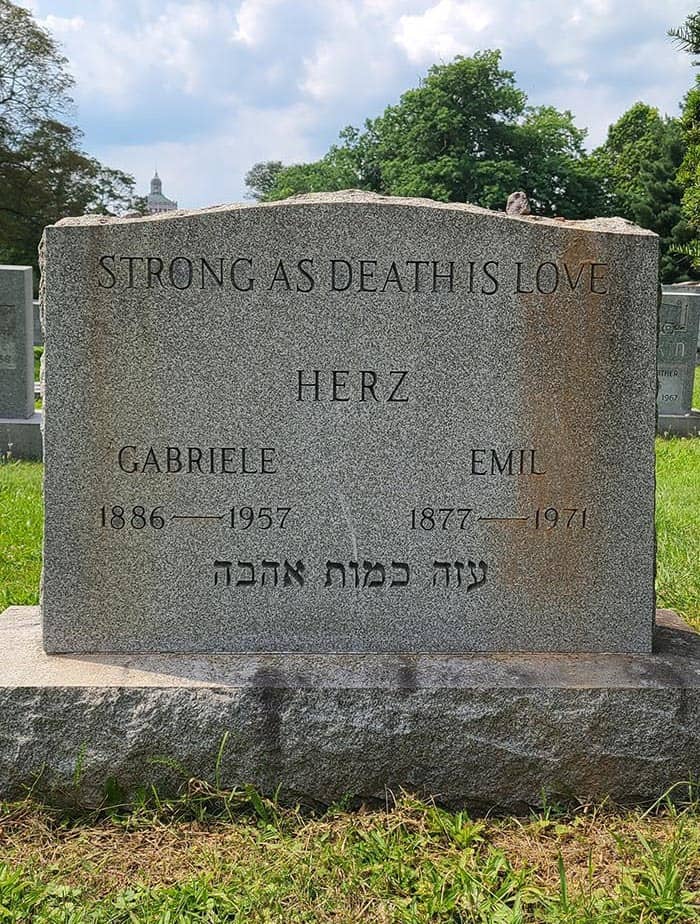
By Marjorie Barkin Searl
Emil (1877-1971) and Gabriele (1886-1957) Herz lived a secure and cultured life in Berlin with their four children. Emil, a descendant of a long line of Jewish scholars and rabbis, was very well educated, having studied history and literature at the University of Bonn with the intention of becoming a professor. However, positions for Jewish professors were limited, so the brilliant and ambitious scholar turned to the publishing industry. He landed a position in 1903 with the prestigious House of Ullstein where he established the Propylaën imprint, which was responsible for introducing some of the most important literature of modern times, including All Quiet on the Western Front in 1929. The firm also published, with his oversight, a six-volume world history as well as the first German paperback series. Only five short years after the publication of All Quiet, an international bestseller, in 1934, Dr. Herz was dismissed from his position by the Nazis, and subsequently became ill. The next year, his wife traveled to Italy to determine if their family would be better off moving there from Germany, because of the onerous restrictions placed on Jews by the Nazi regime. During the course of her stay in Italy, the Nazis enacted a law mandating that if Germans left the country for longer than three months, and then returned, they would be considered to be “remigrants” and punished. In her case, after she returned in 1936 it meant being imprisoned in the women’s work camp, Moringen, around 200 miles from the family’s home in Berlin.
Mrs. Herz’s time in Moringen was preceded by a few days in the Alexanderplatz prison and a short stay in solitary in the women’s prison at Hanover, Germany. In Moringen, she was with women who were sentenced for a variety of crimes, including having broken the Nuremberg Race Laws, which forbade Jews from marrying Aryans. Mrs. Herz, called by her fellow prisoners “Mutter Herz,” or Mother Herz, reflected: “How can a nation which can boast of such enormous achievements, which produced a Bach and a Beethoven, a Schiller and a Goethe, a Kant and a Hegel, sink so low and submit without resistance to the commandments of a single person? But Hitler is probably no isolated phenomenon, rather he is the personification, the ultimate manifestation of the German mass instinct. Perhaps German culture is only a thin crust, beneath which rages a volcano of barely suppressed savage drives. I keep looking for a satisfactory explanation for this innate contradiction, for this dramatic and dangerous conflict within the character of a great nation. I do not find one.”
In Moringen, Mrs. Herz’s fellow prisoners were Jews, Jehovah’s Witnesses, and Communists. Because of her mature and calm presence, she was turned to by many for solace, learning, and leadership. She was asked to give English lessons; she was willing, but the camp administrators refused to give her permission to teach Aryans, as such interaction was forbidden, even in the camp. She wrote movingly of the irrational abuse of prisoners – denial of mail from home, slowdown or stoppage of release even when sentences were completed. She talked of the despair that they all felt – and this was not even the worst of the camp experiences to come, by a long stretch. The cold the hunger, the fear, the sickness – it was all around her. Jewish prisoners from all over Europe were being brought to Moringen; as Gabriele Herz described it, “Some kind of emigration process [from Germany] could have been devised without difficulty. In the past few decades, many nations have implemented such policies humanely and without coercion. They planned them properly, designated the destinations in advance, and paid for them out of public funds. Nazi Germany, on the other hand, robs its Jewish emigrants of even the clothes off their backs, leaves them standing naked and bare at the border. If they cannot get any farther, if they have to come back, what awaits them in their ‘homeland’ is the concentration camps.” Gabriele Herz made use of her enforced jail term by recording the stories of the women who were incarcerated with her, a rich byproduct of a desolate period of time. This experience might easily have destroyed a weaker person; she was not about to let the Nazis take away the joy of living from her, or the determination of her fellow prisoners to survive.
Once reunited, the family emigrated as quickly as possible, first to Switzerland and then to Italy, Cuba, and in 1941 the United States, where they found a permanent refuge in Rochester, NY, and where their son Arthur studied at Mechanics Institute (Now RIT) and later worked for Kodak.
In Rochester, Dr. Herz wrote two books, one of which remains in manuscript form and one of which has been published: Before the Fury: Jews and Germans Before Hitler (Philosophical Library, 1966), which he dedicated “to the memory of my courageous wife”. Gabriele Herz wrote her memoir, The Women’s Camp in Moringen: A Memoir of Imprisonment in Germany 1936-1937. The couple lie together in Mount Hope Cemetery in Rochester, their graves marked by simple stones that belie the trauma of their final years in Germany.

